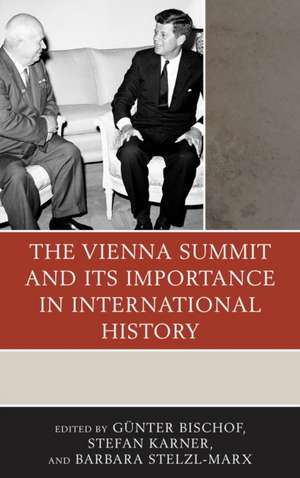VIENNA SUMMIT AMP ITS IMPORTANCEPB: The Harvard Cold War Studies Book Series
en Limba Engleză Paperback – 25 aug 2016
Din seria The Harvard Cold War Studies Book Series
- 27%
 Preț: 791.82 lei
Preț: 791.82 lei - 27%
 Preț: 793.50 lei
Preț: 793.50 lei -
 Preț: 479.50 lei
Preț: 479.50 lei -
 Preț: 472.26 lei
Preț: 472.26 lei - 27%
 Preț: 815.31 lei
Preț: 815.31 lei - 23%
 Preț: 458.89 lei
Preț: 458.89 lei - 27%
 Preț: 798.25 lei
Preț: 798.25 lei - 23%
 Preț: 509.26 lei
Preț: 509.26 lei - 27%
 Preț: 830.76 lei
Preț: 830.76 lei - 27%
 Preț: 1079.73 lei
Preț: 1079.73 lei - 27%
 Preț: 686.05 lei
Preț: 686.05 lei - 27%
 Preț: 792.37 lei
Preț: 792.37 lei - 27%
 Preț: 818.27 lei
Preț: 818.27 lei - 23%
 Preț: 685.98 lei
Preț: 685.98 lei -
 Preț: 479.72 lei
Preț: 479.72 lei -
 Preț: 410.22 lei
Preț: 410.22 lei - 27%
 Preț: 789.65 lei
Preț: 789.65 lei - 23%
 Preț: 654.12 lei
Preț: 654.12 lei - 27%
 Preț: 811.61 lei
Preț: 811.61 lei -
 Preț: 365.00 lei
Preț: 365.00 lei - 27%
 Preț: 964.60 lei
Preț: 964.60 lei - 23%
 Preț: 617.05 lei
Preț: 617.05 lei -
 Preț: 352.40 lei
Preț: 352.40 lei - 27%
 Preț: 977.85 lei
Preț: 977.85 lei - 27%
 Preț: 898.38 lei
Preț: 898.38 lei - 23%
 Preț: 483.98 lei
Preț: 483.98 lei -
 Preț: 476.46 lei
Preț: 476.46 lei - 27%
 Preț: 818.41 lei
Preț: 818.41 lei - 27%
 Preț: 1094.01 lei
Preț: 1094.01 lei - 27%
 Preț: 736.73 lei
Preț: 736.73 lei -
 Preț: 344.23 lei
Preț: 344.23 lei -
 Preț: 476.86 lei
Preț: 476.86 lei - 23%
 Preț: 462.98 lei
Preț: 462.98 lei - 27%
 Preț: 1079.73 lei
Preț: 1079.73 lei - 27%
 Preț: 935.47 lei
Preț: 935.47 lei - 23%
 Preț: 438.74 lei
Preț: 438.74 lei - 23%
 Preț: 589.75 lei
Preț: 589.75 lei - 27%
 Preț: 725.82 lei
Preț: 725.82 lei - 27%
 Preț: 716.53 lei
Preț: 716.53 lei -
 Preț: 379.43 lei
Preț: 379.43 lei -
 Preț: 315.05 lei
Preț: 315.05 lei -
 Preț: 369.00 lei
Preț: 369.00 lei - 33%
 Preț: 507.81 lei
Preț: 507.81 lei
Preț: 503.73 lei
Preț vechi: 654.19 lei
-23% Nou
Puncte Express: 756
Preț estimativ în valută:
96.39€ • 100.91$ • 79.76£
96.39€ • 100.91$ • 79.76£
Carte tipărită la comandă
Livrare economică 07-21 aprilie
Preluare comenzi: 021 569.72.76
Specificații
ISBN-13: 9781498524865
ISBN-10: 1498524869
Pagini: 540
Dimensiuni: 152 x 229 x 32 mm
Greutate: 0.86 kg
Editura: Rowman & Littlefield
Seria The Harvard Cold War Studies Book Series
ISBN-10: 1498524869
Pagini: 540
Dimensiuni: 152 x 229 x 32 mm
Greutate: 0.86 kg
Editura: Rowman & Littlefield
Seria The Harvard Cold War Studies Book Series
Notă biografică
Günter Bischof is a university research professor and director of CenterAustria at the University of New Orleans, Louisiana.
Stefan Karner is head of the Department of Economic, Social, and Business History at the University of Graz and director of the Ludwig Boltzmann Institute for Research of War Consequences, Graz-Vienna.
Barbara Stelzl-Marx is deputy director of the Ludwig Boltzmann Institute for Research of War Consequences and lecturer at the University of Graz.
Cuprins
Descriere
At the beginning of June 1961, the tensions of the Cold War were supposed to abate as both sides sought a resolution. The two most important men in the world, John F. Kennedy and Nikita Khrushchev, met for a summit in Vienna. Yet the high hopes were disappointed. Within months...
